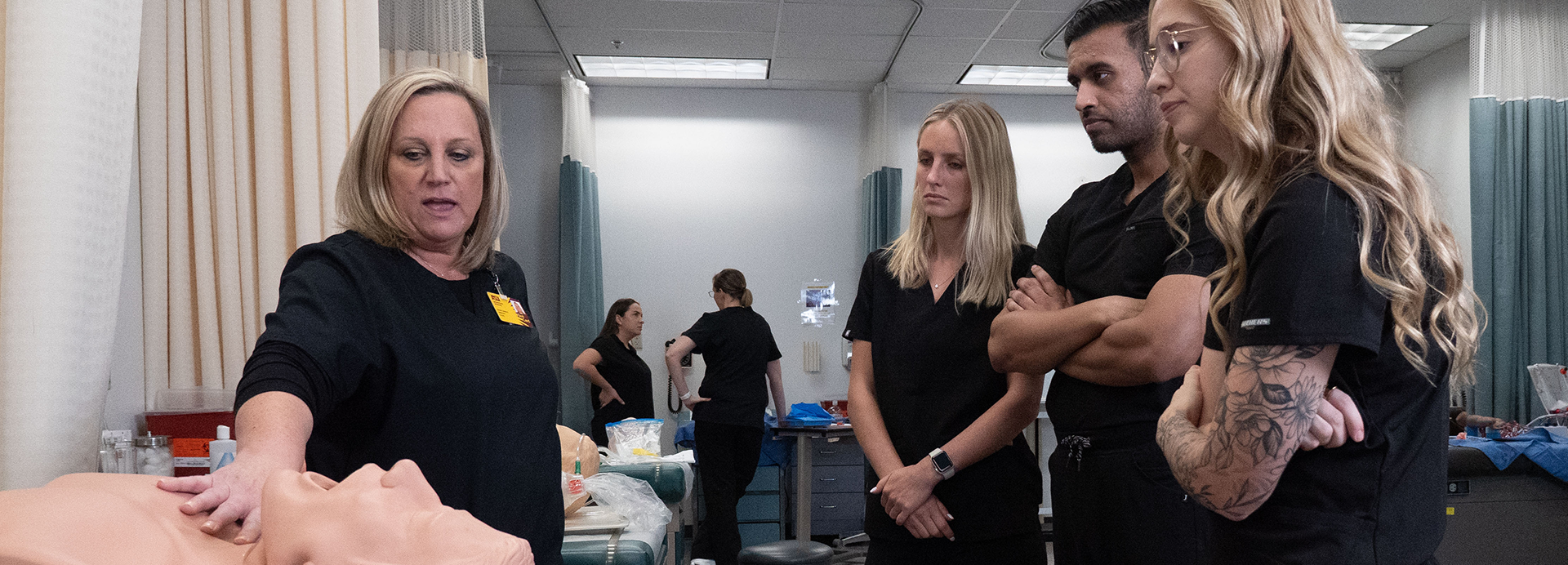

How and When to Apply
Why should I get a DNP?
In 2018, the National Organization of Nurse Practitioner Faculties (NONPF) called for the DNP to be the entry degree for nurse practitioners by 2025.
As of June 2022, the AACN recommends and supports the DNP as entry level for advanced practice nurses.
Many healthcare professions are moving toward obtaining a doctorate before starting practice. The doctorate expands on knowledge acquired at the BSN level and builds on the MSN curriculum to develop highly qualified and competent providers in specific fields.
Priority Deadline is December 15. The DNP Program accepts students based on the amount of clinical placement spots. Rolling admissions will occur after the priority deadline if space is open.
Program Contact
If you have questions related to admission, please fill out the request information form below and an admission specialist will contact you directly. For questions regarding faculty or courses, please use the contact information below.
Admission Requirements
Admission is based upon meeting the following requirements (details within this application):
- Completion of a master’s degree in nursing from a regionally accredited academic institution.
- Students with a Master’s Entry to Professional Nursing (MEPN) or an associate degree/diploma in nursing with a master’s in nursing degree are eligible to apply.
- Applicants must be board certified in an APRN specialty.
- Applicants must have a minimum cumulative GPA of 3.00 (scale is 4.00 = "A") in the last 60 hours of their first bachelor's degree program, or applicants must have a minimum cumulative GPA of 3.00 (scale is 4.00 = "A") in an applicable master's degree program.
- A current unencumbered RN license in the state in which the student plans to do clinical practicums is required. Students are also required to have an unencumbered Arizona or compact state RN license.
- One year of clinical experience working within your specialty population is preferred.
- Three professional letters of recommendation.
- Resume.
- Goal statement.
- Reside in an authorized state while enrolled in the program. See state restrictions: https://admission.asu.edu/academics/authorizations
Consideration for the DNP is based upon meeting the following requirements (details within this application):
- Completion of a bachelor's degree or master's degree in nursing from a regionally accredited academic institution.
- Minimum cumulative GPA of 3.00 (scale is 4.00 = "A") in the last 60 hours of their first bachelor's degree program, or applicants must have a minimum cumulative GPA of 3.00 (scale is 4.00 = "A") in an applicable master's degree program.
- A current unencumbered RN license in the state in which the student plans to do clinical practicums is required. Students must also have an unencumbered Arizona or compact state RN license.
- One year of clinical experience working within your specialty population is preferred.
- Three professional letters of recommendation.
- Resume.
- Goal statement.
- Reside in an authorized state while enrolled in the program. See state restrictions: https://admission.asu.edu/academics/authorizations.
Admission to the graduate program in the Edson College of Nursing and Health Innovation is based upon meeting the following requirements (details within this application):
- Completion of a master’s degree from a regionally accredited academic institution. If your master’s degree is not in nursing, then you must have a bachelor’s degree in nursing.
- Applicants must have a minimum cumulative GPA of 3.00 (scale is 4.00 = "A") in the last 60 hours of their first bachelor's degree program, or applicants must have a minimum cumulative GPA of 3.00 (scale is 4.00 = "A") in an applicable master's degree program.
- A current unencumbered RN license in the state in which the student plans to do clinical practicums is required. Students are also required to have an unencumbered Arizona or compact state RN license.
- Three professional letters of recommendation.
- Resume.
- Goal statement.
- Reside in an authorized state while enrolled in the program. See state restrictions: https://admission.asu.edu/academics/authorizations
Admission is based upon meeting the following requirements (details within this application):
- Completion of a minimum of a bachelor's degree in nursing or Master’s Entry to Professional Nursing (MEPN) from a regionally accredited academic institution.
- Applicants must be board certified in a different APRN specialty.
- Emergency nurse practitioner certificate: Applicants must be a licensed family nurse practitioner or currently enrolled in the family nurse practitioner program at ASU.
- Acute Care Pediatric NP Certificate: Applicants must be nationally certified as a primary care pediatric nurse practitioner. Nationally certified family nurse practitioners working as a nurse practitioner in a pediatric setting will be considered.
- Applicants must have a minimum cumulative GPA of 3.00 (scale is 4.00 = "A") in the last 60 hours of their first bachelor's degree program, or applicants must have a minimum cumulative GPA of 3.00 (scale is 4.00 = "A") in an applicable master's degree program.
- A current unencumbered RN license in the state in which the student plans to do clinical practicums is required. Students are also required to have an unencumbered Arizona or compact state RN license.
- One year of clinical experience working within your specialty population is preferred.
- Three professional letters of recommendation.
- Resume.
- Goal statement.
- Students admitted to the NP certificate programs must complete the following prerequisite courses: Advanced Pathophysiology, Pharmacology, Advanced Health Assessment, and Advanced Practice Nursing Role. If a student has not taken these courses in a previous graduate nursing program, then they will be added to their plan of study.
- Reside in an authorized state while enrolled in the program. See state restrictions: https://admission.asu.edu/academics/authorizations
Learn more about Clinical Placement Information
As a participating National Council for State Authorization Reciprocity Agreements member, Arizona State University is authorized to offer distance education to persons located in individual state authorization reciprocity agreement member states in accordance with the council's established policies and standards. California is not a state authorization reciprocity agreement member, and the California Bureau of Private Postsecondary Education does not regulate out-of-state public institutions for education offered online and in Arizona. ASU may offer educational activities in California. There are some exceptions for specific programs at Edson College of Nursing and Health Innovation. These exceptions are noted on the ASU state authorizations website.
Certificate students
GAP analysis information
Students must maintain Health and Safety standards after acceptance. Review Policies for more details - https://nursingandhealth.asu.edu/student-life/policies-handbook